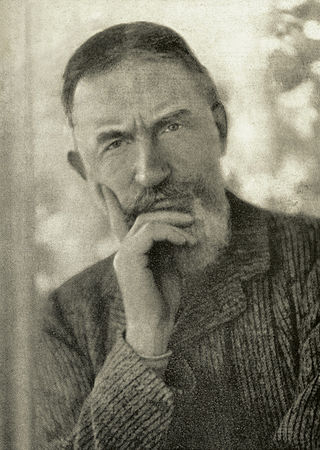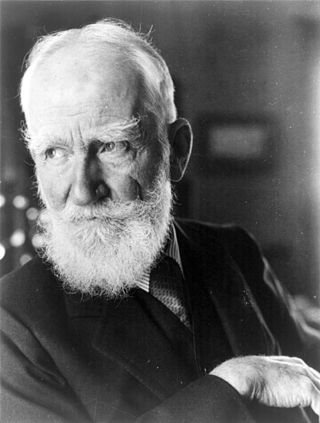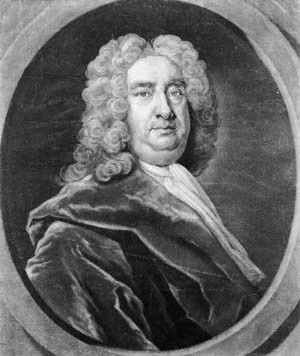
Sir Alexander Fleming was a Scottish physician and microbiologist, best known for discovering the world's first broadly effective antibiotic substance, which he named penicillin. His discovery in 1928 of what was later named benzylpenicillin from the mould Penicillium rubens has been described as the "single greatest victory ever achieved over disease". For this discovery, he shared the Nobel Prize in Physiology or Medicine in 1945 with Howard Florey and Ernst Boris Chain.

George Bernard Shaw, known at his insistence as Bernard Shaw, was an Irish playwright, critic, polemicist and political activist. His influence on Western theatre, culture and politics extended from the 1880s to his death and beyond. He wrote more than sixty plays, including major works such as Man and Superman (1902), Pygmalion (1913) and Saint Joan (1923). With a range incorporating both contemporary satire and historical allegory, Shaw became the leading dramatist of his generation, and in 1925 was awarded the Nobel Prize in Literature.

Joseph Lister, 1st Baron Lister, was an English surgeon, medical scientist, experimental pathologist and a pioneer of antiseptic surgery and preventive healthcare. Joseph Lister revolutionised the craft of surgery in the same manner that John Hunter revolutionised the science of surgery.

Sir John Pringle, 1st Baronet was a British physician who has been called the "father of military medicine".

Sir Almroth Edward Wright was a British bacteriologist and immunologist.

The Doctor's Dilemma is a play by George Bernard Shaw first staged in 1906. It was published in 1909. It is a problem play about the moral dilemmas created by limited medical resources, and the conflicts between the demands of private medicine as a business and a vocation.

Heartbreak House: A Fantasia in the Russian Manner on English Themes is a play written by George Bernard Shaw, first published in 1919. The English language premiere was at the Garrick Theatre in November 1920. According to A. C. Ward, the work argues that "cultured, leisured Europe" was drifting toward destruction, and that "Those in a position to guide Europe to safety failed to learn their proper business of political navigation". The "Russian manner" of the subtitle refers to the style of Anton Chekhov, which Shaw adapts.
Evolutionary ethics is a field of inquiry that explores how evolutionary theory might bear on our understanding of ethics or morality. The range of issues investigated by evolutionary ethics is quite broad. Supporters of evolutionary ethics have argued that it has important implications in the fields of descriptive ethics, normative ethics, and metaethics.

George Cheyne, M.D. R.C. E.d. R.S.S., was a pioneering physician, early proto-psychiatrist, philosopher and mathematician.

Rear admiral Sir William Watson Cheyne, 1st Baronet, was a Scottish surgeon and bacteriologist who pioneered the use of antiseptic surgical methods in the United Kingdom.
The Shaw Festival is a major Canadian theatre festival in Niagara-on-the-Lake, Ontario, the second largest repertory theatre company in North America. Founded in 1962, its original mandate was to stimulate interest in George Bernard Shaw and his period, and to advance the development of theatre arts in Canada.

The Doctor's Dilemma is a 1958 British comedy-drama film directed by Anthony Asquith and starring Leslie Caron, Dirk Bogarde, Alastair Sim, and Robert Morley. It is based on the 1906 play The Doctor's Dilemma by George Bernard Shaw. A satire on the pretensions of the medical profession and their concentration on treating patients who can pay well, it contrasts their world of imperfect science, always bumping up against unknowns, with the boundless spheres of love and beauty.

As You Like It is a pastoral comedy by William Shakespeare believed to have been written in 1599 and first published in the First Folio in 1623. The play's first performance is uncertain, though a performance at Wilton House in 1603 has been suggested as a possibility.

Too True to Be Good (1932) is a comedy written by playwright George Bernard Shaw at the age of 76. Subtitled "A Collection of Stage Sermons by a Fellow of the Royal Society of Literature", it moves from surreal allegory to the "stage sermons" in which characters discuss political, scientific and other developments of the day. The second act of the play contains a character based on Shaw's friend T. E. Lawrence.

The British Party System (1944) is a "playlet" by George Bernard Shaw satirically analysing the origins of the party system in British politics in the form of a pair of conversations between scheming power-brokers at various points in history, who devise it and adapt it to suit their personal ends.

Geneva, a Fancied Page of History in Three Acts (1938) is a topical play by George Bernard Shaw. It describes a summit meeting designed to contain the increasingly dangerous behaviour of three dictators, Herr Battler, Signor Bombardone, and General Flanco.

Arthur and the Acetone (1936) is a satirical playlet by George Bernard Shaw which dramatises an imaginary conversation between the Zionist Chaim Weizmann and the British Foreign Secretary Arthur Balfour, which Shaw presents as the "true" story of how the Balfour Declaration came into being.

The Inca of Perusalem, An Almost Historical Comedietta (1915) is a comic one-act play written during World War I by George Bernard Shaw. The plot appears at first to be a fairy-tale like story about a fantastical "Inca", but it eventually becomes obvious that the Inca is Kaiser Wilhelm II of Germany.

Beauty's Duty (1913) is a short uncompleted "playlet" by George Bernard Shaw. It is a dialogue between a man and his lawyer about the man's wife. The husband has traditional views on marriage. The wife is more idiosyncratic in her thinking.

Clan Cheyne is a Scottish clan. The clan is officially recognized by the Lord Lyon King of Arms; however, as the clan does not currently have a chief recognized by the Court of the Lord Lyon, it is therefore considered an armigerous clan. The surname Cheyne is also recognized as a sept of the Clan Sutherland, and is accepted as such by the Clan Sutherland Society in Scotland.












